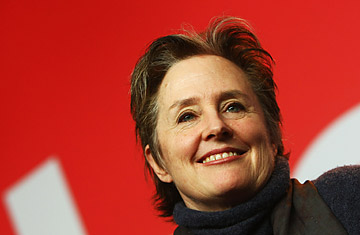
Food activist Alice Waters
When Michelle Obama broke ground on the new White House vegetable garden, there was probably no one in America more elated than Alice Waters. For months, Waters had been engaged in a very public lobbying effort to get the First Family to take this step in the name of healthy, sustainable eating. The mother of the local-food movement and owner of Berkeley's famed Chez Panisse restaurant talked to TIME about President Kennedy's influence on her ideals, why she has a newfound love for the Department of Agriculture and how a well-made pasta dish can soften the psychological blow of the recession. (See the top 10 food trends of 2008.)
This isn't the first time you've lobbied a President to plant a garden at the White House, right?
I've been writing letters since 1992.
And have you gotten any responses before now?
I got several from the Clintons. Hillary ended up planting some tomatoes on the roof of the White House at one point. But down there by the Rose Garden is what really interested me. I think that speaks to a nation. (See 10 Ideas Changing the World)
How did you find out the Obamas were going to go full force with the garden?
I had a call from the White House before it happened saying it was very likely. A lot of people had given me the impression that it would happen at some point. I just didn't expect it so soon.
Do you have any actual food-related legislative priorities you want to see President Obama focus on?
We need to have a course in school that teaches about ecology and gastronomy. I could imagine that all children could eat at school for free and that the cafeteria would become part of the school's curriculum. I mean, 20% of the [nation's] population is in school! The way I could [see] this happening is the way JFK talked about physical education. He spoke to everyone in this country, saying that we were not fit for the new frontier and that we had to take a course in P.E. We needed to get graded on it and it needed to be a part of the core curriculum in every school. And we did it.
What's your opinion of Tom Vilsack, Obama's new agriculture secretary?
I've been very pleased that he seems so open and willing to talk with people who are part of this movement. I'm extremely hopeful.
Wow. It's rare to hear someone from your camp sound so hopeful about the Department of Agriculture.
It's very surprising. We've been a little bit asleep for 20 or 30 years and we're waking up to the fact that we're not eating food that's really good for us and we're not taking care of the land and the farmers. There's a moral imperative because most children eat at school and the food that they're eating is making them sick. We are willing to put billions and trillions of dollars into things right now and if there's a place of need, it's in the public schools.
You've been working on these issues for decades, but it's only recently that we've seen organic food at grocery stores all over the country. What do you think pushed the local/organic issue from a niche thing into a mass movement?
I think it happened in the same way that Obama's election happened — young people. They are inviting their friends over for dinner. They're growing their own food. They are making their own bread. For me to be around this age group is revitalizing. (See pictures of avant-garde gardens.)
In Berkeley, you're lucky to have a huge variety of seasonal food year-round. But elsewhere, isn't it pretty hard to say to people, 'No more oranges in the winter time and no more bananas ever'?
At Chez Panisse, yes, we can have salad all year long. But we also have dried beans, winter squashes, root vegetables from the root cellar, turnips and all the heritage colors of carrots. We can our tomatoes and we use huckleberry syrup that we've made in the summer. We just think about food differently. And we have the wealth of knowledge of how to do this from the cuisines around the world. I look along my latitude and I can find people in other countries who are so imaginative with the way they eat in the cold months.
Do you see any danger in big agriculture taking over the organic market?
I think they're taking fast-food values and just applying them to the least strict organic standards. That's not what this is about. We know the five big companies that run this country in terms of food are vulnerable in so many ways, like food safety.
We're not just talking about this product that doesn't have herbicides and pesticides. We're talking about farm workers and the conditions under which they produce that food. We're talking about a kind of biodiversity of the land. We're talking about a care for the land beyond the superficial. Food isn't like anything else. It's something precious. It's not a commodity.
With the economy like it is ...?
How can we afford this, right?
Well, I know you've said that if we care about these things, it's worth it to spend a little more. But what do you say to people who are destitute?
It's about coming back to your senses and coming back to the table. When you don't have much money, cooking can be incredibly reassuring. You feel like you're doing meaningful work. A little garlic pasta with some herbs in it — I call that my "coming home pasta." It's that kind of very American idea that could rise up here and help us. You feel like you're doing this for your family, for the world. It's the victory garden!
